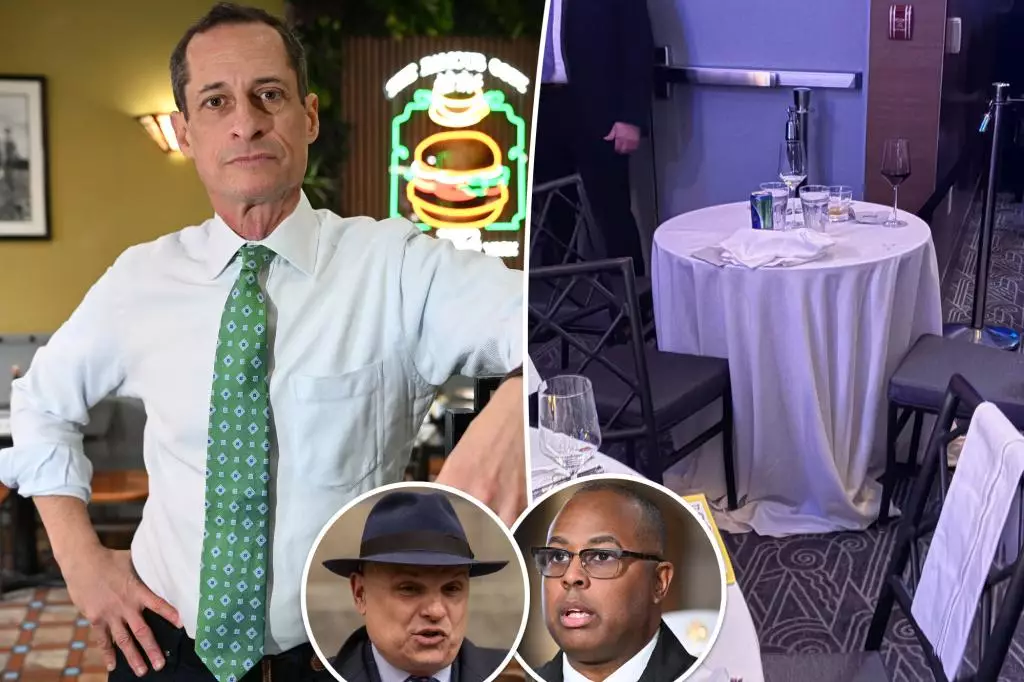In the glittering world of New York’s political elite, even the seating chart can spur laughter and judgment. The Inner Circle dinner—an annual extravaganza where the political and media realms collide—recently offered a glimpse into the nuances of status through an amusing mishap involving disgraced former congressman Anthony Weiner. Photos and gossip surrounding Weiner’s relegation to what insiders dubbed “the small Weiner table” sparked a frenzy of talk. The event, traditionally characterized by its lighthearted roasts of political figures, took an unexpected turn as guests reveled in Weiner’s misfortunes.
An eyewitness recounted how Weiner’s initial seating arrangement changed due to a “snafu” that ultimately left him at a diminutive table right in front of the stage. Far from enjoying the evening as a distinguished guest, Weiner found himself at a “kids’ table,” akin to being placed at a distance from the main conversation and camaraderie. The humor wasn’t lost on the surrounding guests who found amusement in Weiner’s predicament. It’s somewhat poetic; a man whose political career was defined by scandal found himself seated as if he were once again a child at a family gathering.
A Comedy of Errors: Miscommunication or Just Bad Luck?
As with many entertaining tales, the backstory offers a humorous blend of human error and miscommunication. Arthur Aidala, Weiner’s long-time attorney and friend, came forward to explain that the original arrangement had been a mistake, claiming, “They just screwed up.” Aidala, with a fraught history of navigating the political and legal waterways of New York, provided a sense of solace by insisting that the confusion arose from the venue’s oversight on seating capacities. After a short discourse on the mix-up, it became clear that the mishap was as innocent as it was awkward, yet it showcased the unpredictability of high-profile social events.
The Inner Circle dinner is not just a glitzy gathering; it serves a more profound purpose, fundraising for charity while offering biting satire of political figures. This juxtaposition captures a nuanced reality: even in positions of power, individuals are not immune to laughable oversights. Weiner’s struggles with public perception epitomize this irony starkly; while he attempted to reenter the political arena, he was simultaneously surrounded by the echoes of past follies that still resonate in the city.
Transparency and Trust: Weiner’s Comeback Trail
Anthony Weiner’s reemergence in the political landscape—as he campaigns for a seat on the City Council—is audacious yet intriguing. In his email explanation post-event, he insisted that his early departure had nothing to do with his table placement. Instead, he indicated he had prior commitments with his son, underscoring a desire to maintain family bonds amid public scrutiny. This perspective perhaps offers a more empathetic view of Weiner, one that transcends the entertainment value of his social blunders.
Aidala’s support for Weiner is notable, particularly against the backdrop of New York’s often unforgiving political landscape. Their longstanding friendship, which has weathered storms both personal and political, might reflect the nuanced fabric of human interaction in high-stakes environments. Weiner’s journey reveals profound themes of redemption and resilience—resonating within a broader societal context where second chances are far from guaranteed.
The Underbelly of Political Gatherings
The Inner Circle dinner serves as a reminder that political gatherings often mask deeper connections and conflicts. While the evening’s roast of public figures like Mayor Eric Adams and Governor Kathy Hochul is delivered with playful irreverence, it simultaneously prompts onlookers to reflect on the intimate networks that underpin these events. Laughter and rivalry coalesce, creating an atmosphere where both respect and disdain mingle, particularly for those in precarious situations like Weiner.
New York City remains a vibrant tapestry where power dynamics unfold in public settings. Political gatherings—bawdy and extravagant—not only highlight the personalities involved but also reveal the intrinsic vulnerability of even the most high-profile figures. Weiner’s mishap at the Inner Circle was more than mere comedy; it was a stark reminder that while some may appear to reclaim their former glory, the edges are often frayed and humorous—leaving spectators both entertained and contemplative of the fragility of fame.
In the grand scheme of political theater, the “kid’s table” incident stands out; it bridges the gap between innocence and experience, encapsulating the often surreal nature of public life. Perhaps, in the end, it’s not just size that matters—it’s the laughter that echoes long after the gala has come to a close.
